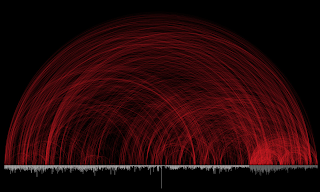I came across this graph of biblical contradictions as I was browsing the internets the other day and though this was interesting enough to share. It's an enormous image plotting a large number of Biblical contradictions (439) with multiple sources for each specific instance. It might not be the best reference in practicality, but it does look pretty cool. Cool enough to make a wall poster, perhaps? It was made by The Reason Project, created by Sam Harris and his wife, of whom I am big fans.
It's pretty astounding that there are still so many people who deny that there are any contradictions in the Bible at all - as if it were some perfectly consistent book that people have continuously tried to poke holes in but somehow never could. To anyone who has actually done research on it, they know the fundamentalist claim is a bunch of crap, but for people who don't know or would just rather believe otherwise, it's a relatively easy claim to make. You don't really have to know anything about what's in the bible or have fully read it, and in the event that a good, sound contradiction is proposed, it can usually be dismissed by a wave of the hand to the tone of, "you're taking it out of context," "you don't understand the full meaning of the passage," or, my favorite, "God works in mysterious ways."
I think the real answer is obvious - it's a collection of writings made by many different men over a long period of time. Most 120-minute long movies don't go without some kind of plot holes; why should we expect any differently from a 788,258 word mega-book? I doubt that the document I have linked above is even an exhaustive list, but it's certainly a good starting point and enough to chew on for those who may think that the bible is the infallible and inerrant word of an all-knowing god.
To be fair, I certainly haven't checked all of these myself (though I did look up a few I wasn't familiar with) and I grant that not all of these may even be contradictions. Some may simply be legitimate misunderstandings or translation issues. However, that begs the question: is a book so poorly written as to be interpreted differently by almost every Christian indicative of the work of an all-powerful god? If so, I think I could do him one better, and if not, why give him the omni-attributes in the first place? Something to think about.

0 Comments:
Post a Comment